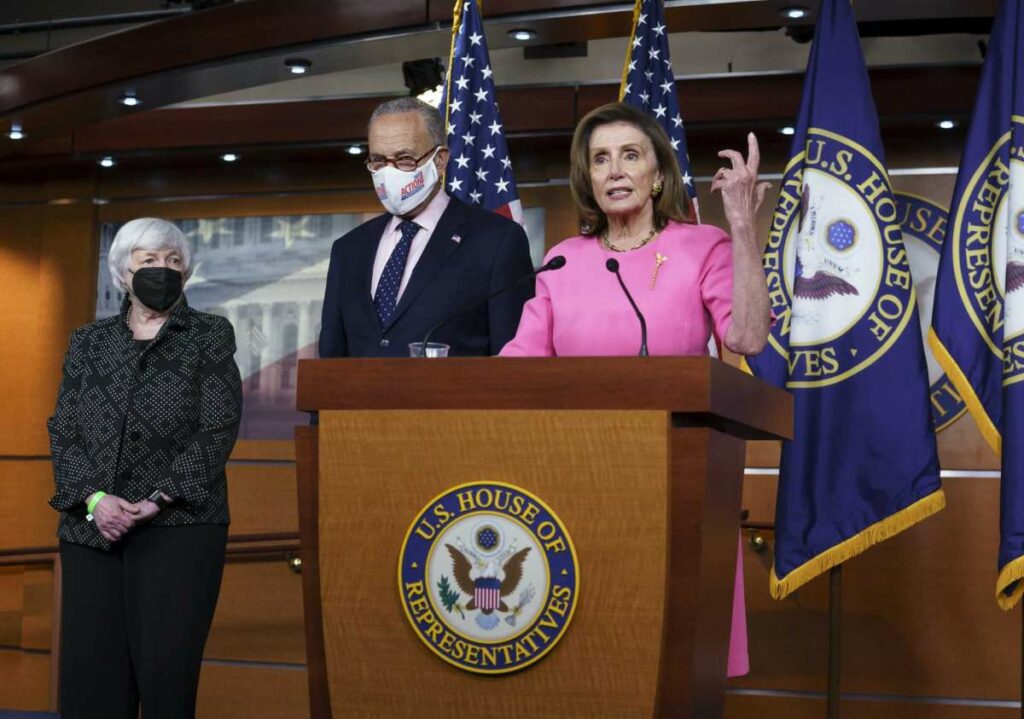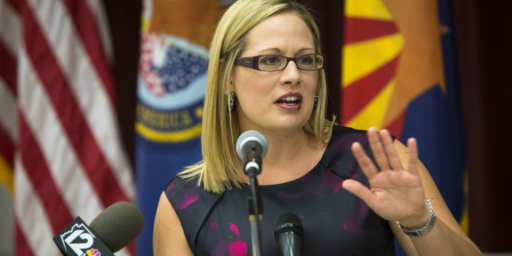Dems in Disarray, Deal Doubtful
The internecine fight over the budget is coming to a head.

POLITICO (“Manchin, Sinema leave Dems in lurch as Biden agenda teeters“):
Democrats wanted clarity Tuesday from Sens. Joe Manchin and Kyrsten Sinema after back-to-back meetings with President Joe Biden. They didn’t get it.
During a private meeting with the president, Sinema made clear she’s still not on board with the party’s $3.5 trillion social spending plan and is hesitant to engage on some specifics until the bipartisan infrastructure package passes the House, according to a person who spoke with her.
“This is the third time she said she has told the president, ‘I’m not there,'” the person said, quoting Sinema as telling the president: “‘I’ve been very clear with you from the start.'”
Sinema has problems with both the price tag and some of the tax increases devised to pay for it. After returning from his White House meeting, Manchin said that he did not give Biden a top-line number and made “no commitments from my standpoint.”
Sinema and Manchin’s approach to the negotiations has frozen Biden’s jobs and families plan and potentially may lead to a high-profile failure of a bipartisan infrastructure bill on the House floor as progressives threaten rebellion. But without more details from the moderate duo, any hope of a bicameral agreement on Biden’s agenda is a pipe dream.
Well, yes. That’s been clear for months. That Sinema and Manchin want a smaller bill is hardly a last-minute twist. Their continuing refusal to specify what it is they will support, however, is a reasonable cause for frustration.
NBC (“‘Mutually assured destruction’: House liberals dig in on halting infrastructure bill“):
House progressives are digging in on their resistance to passing the infrastructure bill this week, repeating their threat to block the measure despite Speaker Nancy Pelosi’s call to pass it quickly and tackle the social safety net package later.
Rep. Pramila Jayapal, D-Wash., the chair of the progressive caucus, which boasts 95 House members, told NBC News that “nothing has changed” and more than half her caucus is prepared to vote down the infrastructure bill if it comes up before the larger tax-and-spending bill has passed the Senate.
The wrangling comes during a chaotic week where Democrats are locked in a separate standoff with Republicans over how to keep the government funded ahead of a Thursday night deadline and avert debt default before an Oct. 18 cutoff.
The progressive resistance won support from allies the Senate, as Sen. Bernie Sanders, I-Vt., called on House colleagues “to vote against the bipartisan infrastructure bill until Congress passes a strong reconciliation bill.”
“My fear is that if the dual agreement that was reached is broken, and we just pass the infrastructure bill, the leverage that we have here in the Senate to pass the reconciliation bill will be largely gone,” Sanders said in an interview.
The intraparty feuding casts doubt over whether the House can pass the infrastructure bill on Thursday, as Pelosi has planned — even though Democrats are united in support of the legislation. The larger bill isn’t yet ready for a vote yet and is still being drafted, as Democrats work through a series of disputes over price tag and policy.
“Casts doubt” is putting it mildly.
San Francisco Gate (“Nancy Pelosi drama with Chuck Schumer creates more issues for Biden’s agenda“):
Senate Majority Leader Chuck Schumer does not seem to approve of House Speaker Nancy Pelosi’s plans to have her chamber vote on a bipartisan $1 trillion infrastructure bill Thursday.
[…]
On a Tuesday call with Senate Democrats, Schumer reportedly took heat from Democratic senators who took issue with Pelosi’s move. According to CNN’s Manu Raju, Schumer “told his caucus he was not consulted before Pelosi reversed course.”
During a brief press conference after the call, Schumer was asked whether he supports Pelosi’s strategy and said only, “The bottom line is I think we certainly in the Senate believe in a two-track process and I believe Speaker Pelosi believes in a two-track process as well.”
“So not saying explicitly that he supports her strategies,” Raju said during a TV appearance after the presser. “[It’s] significant — these two leaders are typically always on the same page and talking frequently, but at a key time, not here.”
While it’s axiomatic that deadlines make deals, it’s simply bizarre that we’ve reached the day before the fiscal year ends without the party that holds a razor-thin majority agreeing with itself what it wants. Given that literally every Democratic Senator has to go along to get anything passed, and given the ideological polarity within the caucus, that’s a frustrating job. But, again, it’s hardly new news.
Meanwhile, as I may have noted once or twice in previous posts, the Republicans are adding to the stress levels by playing silly, dangerous games with the debt ceiling.
POLITICO (“Biden opposes changing Senate rules to raise debt limit“):
The White House said Tuesday that President Joe Biden opposes changing the filibuster to suspend or raise the debt ceiling, closing off a break-the-glass option to avoid financial calamity.
White House press secretary Jen Psaki confirmed that Biden’s position on reforming the filibuster has not changed as Democrats search for options to deal with the approaching debt ceiling deadline amid persistent refusal from Senate Republicans to step in and help. Earlier in the day, Treasury Secretary Janet Yellen warned congressional leaders that her department could run out of money by Oct. 18, triggering a disastrous default on the government’s debt that would cripple the entire U.S. economy.
My initial reaction was Who cares what Biden thinks? Manchin and others have made it clear that they will not support the abolition of the filibuster. It’s simply not going to happen in this Congress.
Senate Minority Leader Mitch McConnell has said that Democrats should raise the ceiling alone, but he has also closed off all avenues for them to do so, save one: an amended reconciliation bill that would occupy a fair chunk of Senate floor time before Democrats could pass it by party-line vote.
Democrats in Congress are at odds over whether they have enough time to do that and the next steps forward. The party tried to pass a debt limit hike alongside a measure to fund the government last week. But that was filibustered by Senate Republicans.
On Tuesday, Democrats sought unanimous consent to pass a debt ceiling hike by a simple majority vote. Republicans objected to that too, further angering White House officials who were already chafing at their refusal to fall in line on a vote they’ve been trying to portray as almost pro forma.
Biden has coordinated his approach with House Speaker Nancy Pelosi and Senate Majority Leader Chuck Schumer, but has publicly deferred to the congressional leaders on how to maneuver out of the jam. On Monday evening, they discussed possibly raising the debt ceiling through budget reconciliation, something White House officials had been saying they were loath to do.
One other option: The Senate could vote to change their own rules so that a bill that raises or suspends the debt limit is not subject to a filibuster. Lawmakers have made similar rules changes for the confirmation of judicial nominees and Cabinet officials. But it would require all 50 Democrats to support such a measure as well as Vice President Kamala Harris’ sign off. Biden’s opposition to such a change would effectively doom it.
Ah. So, this would be just another exception to the filibuster. It’s not obvious that Manchin and others would go along with that, either, but Biden’s opposition does indeed essentially preclude Harris from going along.





Anyone ever seen the joke about some crisis like the end of the world is happening, the Republicans are blocking any attempt to respond to the crisis, and a clueless journalist is covering it as “Dems in Disarray” instead of actually focusing on the Republican bad behavior?
And I’m sure we’ll now get one of Dr. Joyner’s patented, “but I mentioned the Republicans in one sentence deep down in my thousands of words about the exact opposite, so the fact my whole premise is off doesn’t count!” responses.
At least Manchin has given some numbers: corporate taxes cannot be over 25% and he can support a 1.5-2.0 trillion dollar reconciliation bill with many caveats. Sinema’s does not provide any numbers but they can be be negotiated later- why no parameters? It’s baffling and my take is that she is not negotiating in good faith. She does not want reconciliation but if she says so she dooms the other bill which may well be what happens.
@Raoul: “At least Manchin has given some numbers: ”
Riiiiiiggggghhhht. We’ve seen this before.
@Stormy Dragon: I’ve written multiple posts about the Republican shenanigans with the debt ceiling. But this is actually about Dems in disarray: Even absent a filibuster, these bills are going nowhere until Dems get their act together. They don’t have their own coalition together.
@James Joyner:
Realistically, the Dems’ situation in the Senate should be described as they have 50 votes for most procedural things, and 48 for actual policy. Well, 50 for a select set of things: traditional infrastructure, a CR to keep the government going, and probably for a modest increase in the debt limit. Policy items that they simply don’t have 50 votes for: relaxing the filibuster, anything that would seriously address climate change, major new social spending programs, significant reform of federal elections.
As you front pagers regularly point out, US political parties are weak. They can’t keep people out of the party; they can’t keep candidates out. Add that the system overall heavily favors incumbents and you have people whose attitudes were set 40 years ago still in office, even though they no longer accurately reflect their constituents. John McCain died at a good time for his legacy. I was among the people who said, “He represents an Arizona that no longer exists, and in another few years that will become painfully clear.”
FWIW, the proof of the disarray will me in the lack of a pudding, so we shall see. (That is to say I often find journalism about bills-in-process to often be sensationalistic and/or incomplete).
I will agree, however, that ultimate success or failure belongs to the Democratic Party (if we are assigning to parties and not individual members of parties). They have the tools, in theory, to do what they want, but it requires filibuster reform and other tactical maneuvers. They won’t get GOP help on most of this no matter what (and such is the role of majorities and minorities in legislatures and, further, what happens with narrow margins–with all caveats about the unrepresentative nature of our system always being in place).
@Michael Cain: Oh, I absolutely agree that the leadership has very little leverage. I’m just pointing out that the situation has been clear for a long time and it’s just baffling that they haven’t managed to work out a compromise within their own caucus by now.
@Steven L. Taylor: Without filibuster reform, there’s only so much even a united Democratic caucus can do. But this is legislation they’re planning to pass on reconciliation.
I think Schumer is wrong here. The bipartisan bill has to go down in defeat before Sinema and Manchin start negotiating. What we end up with is going to be smaller than the progressive caucus wants, and held together at the last minute with bailing wire and duct tape.
The two-track plan was a bad idea from the start. If Manchin wants his bipartisan vote, it can be for an amendment on the reconciliation package, so it all passes together.
@James Joyner: It is possible that tomorrow we will see that no compromise is possible. The progressives in the House may kill the infrastructure bill out of spite. Down the road a bit I suspect we will find that there is nothing Joe Manchin wants more than stripping all the climate change money out of the budget bill, but some western state Senators whose re-election depends on delivering that money.
@Gustopher:
The ironic thing is that if the BIF actually was bipartisan, it would easily pass the house whether the progressive caucus liked it or not. They’re only able to hold it hostage because no house Republicans at all will vote for it.
But again, that would require a focus on Republican obstructionism instead of the “Dems in Disarray” spin.
Well, yeah, but the only reason that they won’t specify what they will support is because to do so would mean admitting that NO BILL IS ACCEPTABLE TO EITHER OF THEM. I wouldn’t want to admit that either.
Seriously, what is baffling about the immense difficulty in reaching compromise in a caucus that is 1) not monolithic, 2) working it alone in a two party system, and 3) seriously trying to address at least 10 years of legislative failure to address the most critical challenges facing the country?
The sausage making is ugly and always has been. It’s even uglier now because the stakes are so high and the bad faith has been so normalized.
It can be argued if the Democrats were in array, they’d have junked the filibuster and be passing legislation twice a week.
@Michael Cain: I don’t think the progressives would vote it down because of “spite”, it’s strategy. If they pass the bipartisan bill without the other reconciliation infrastructure bill, they lose a ton of leverage, and then the “moderates” could whittle it down to nothing.
The other thing is that the progressives have been willing to negotiate and compromise (because they already have) with the “moderates” but the “moderates” are forcing this (especially Sinema, as was mentioned above). If the progressives want a substantial infrastructure bill through reconciliation, then this is their only gambit.
Mid afternoon, I happened across this article from yesterday’s TNR Daily email. I’m not completely sure, but I don’t think this argument establishes the validity of the article’s title/thesis. It seems only theoretically possible to me.